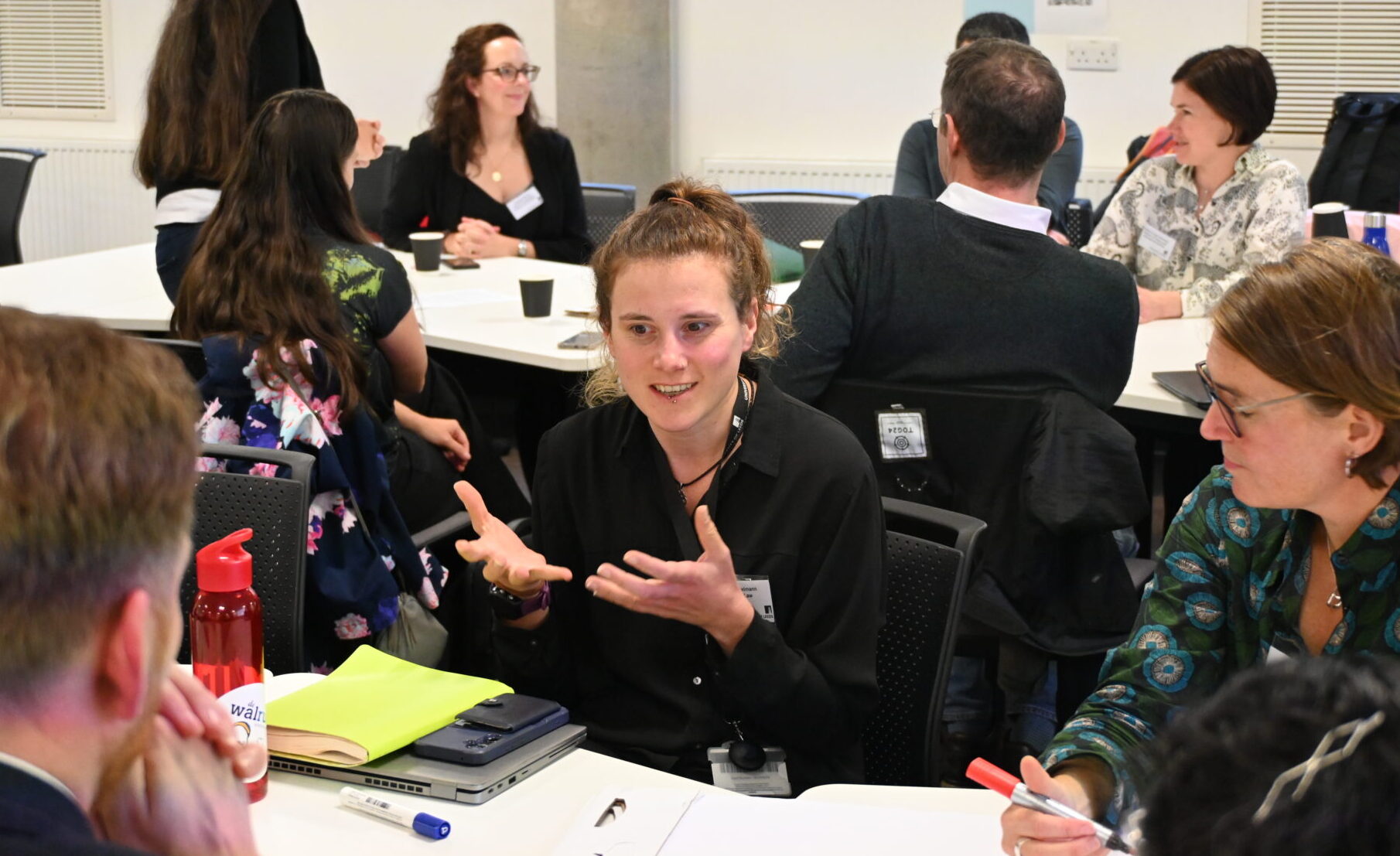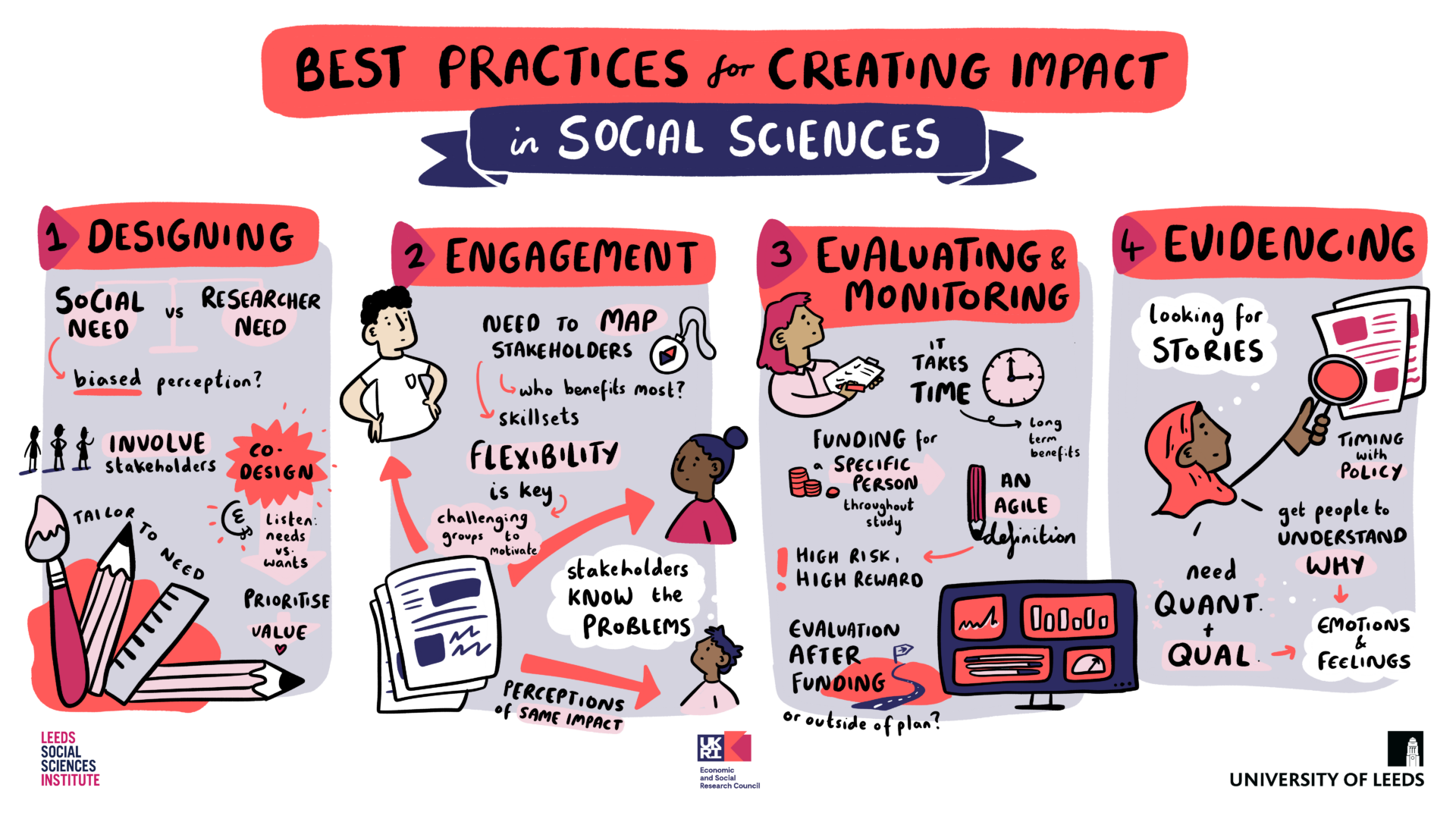Best Practices for Creating Impact in Social Sciences

Blog post prepared by Sherif Youssef, Leeds Social Sciences Institute Partnerships and Engagement Officer
Some academics and professionals tend to ask themselves: How can I boost my research impact? What can I do to have a potential Research Excellence Framework (REF) impact case study? How do I start my impact journey? The Best Practices for Creating Impact in Social Sciences event was organised by Leeds Social Sciences Institute (LSSI) to answer some of these questions. The event provided an opportunity for previous and current Economic and Social Research Council (ESRC) Impact Acceleration Account (IAA) award holders to share research impact best practices and experiences with academics interested in applying for future IAA awards.
In an era of considerable socioeconomic and political challenges, knowledge creation alone is insufficient. Scholars must navigate unfamiliar terrain by disseminating their research outside academic corridors. In other words, scholars must raise awareness about their research among the public so that it may be used to solve societal issues. This requires a unique skill set, such as building relationships and engaging with key people who might be interested in the research, active engagement in the co-production of knowledge, and impact dissemination.
In general, research impact is a fundamental requirement for national and international funding bodies. The United Kingdom’s Research Excellence Framework (REF) emphasises the importance of academic research having a measurable impact by influencing societal change and realising real-world improvements. At the heart of the University of Leeds Institutional Strategy is a robust impact agenda that aims to tackle inequalities, achieve positive societal impact and drive positive change. This strategy is clearly reflected in LSSI’s overall mission of supporting interdisciplinary collaboration across the university and promoting a culture of impact-oriented research.
The Event
The event attracted a diverse set of academics and professionals representing different faculties across campus. The event itself was divided into three parts. The first started with a short keynote by Professor Paul Johnson the Executive Dean of the Faculty of Social Sciences, where he highlighted the important role and mission of social scientists in addressing important societal challenges currently facing our communities by producing relevant and impactful interdisciplinary research. Next, Professor Louise Waite the Director of Leeds Social Sciences Institute, provided an overview of the diverse work performed by LSSI. The institute supports academics in achieving their impact by providing different opportunities for skills development, capacity building, knowledge exchange, and public and policy engagement for social science research.
This event played a role in sharing best practices for creating impact within our academic community. The event also showed the magnitude of our interdisciplinary research we have here at the University of Leeds
Professor Paul Johnson
In the second part of the event, academics presented impact-driven research on topics ranging from seasonal workers and low skilled migration led by Dr Roxana Barbulescu from the School of Sociology and Social Policy, fuel poverty led by Professor Lucie Middlemiss from the School of Earth and Environment, active travel led by Dr Peter Hart from the School of Education, and maternal health partnerships in Kenya led by Professor Shane Doyle from the School of History. Additionally, the attendees were given an overview of the impact training opportunities provided by Ged Hall from Organisational Development Professional Learning (OD&PL) to researchers.
Event outputs

The final part of the event was a roundtable discussion that encouraged participants to contemplate the five principles underpinning research impact – designing impact, engagement, evaluating and monitoring impact, evidencing impact, and reflect and sustain – based on Mark Reed’s Research Impact Handbook.
The first element discussed was designing impact, including various methods to embed it in research from the outset by using theory of change and logic models, stakeholder mapping and co-production of research. The key theme here was to encourage participants to think critically about the envisioned impacts of their research.
A significant part of our work at LSSI is around improving the skills and capacity of our research community to create impactful solutions to real world challenges – this event provided an opportunity to learn from each other and to drive this agenda further forward.
Professor Louise Waite
The second element was engaging with stakeholders and communities. It is important for researchers to engage with local policy makers, business leaders or charities to build long-term relationships based on mutual respect, adaptability, and flexibility to ensure effective engagement. This can be achieved through creative engagement from the outset of the research using the principles of co-production research approaches.
The third element was evaluating and monitoring research impact, which can be realised by analysing data usage for research outputs for policy briefs, project reports and social media posts. Additionally, surveys, informal interviews and personal testimonies can play a role in collating feedback. Finally, researchers must consider mechanisms to measure the long-term impact of their research beyond the lifespan of the project.
The stories are the data.
Event Participant
The fourth element was evidencing impact. This can be achieved through quick wins such as public briefs, using storytelling approaches captured from conversations and emails that act as qualitative data in evidencing impact. Additionally, during the data gathering, researchers should understand the ‘why’ of the impact not just the ‘what’. This will enable researchers to think critically about their data gathering approaches for long-term impact. Finally, researchers should be open to both sharing success and accepting and documenting failures for future learning and improvement.
It is important to showcase different types of impact, not just big hitters. Accept failures.
Event Participant
The final element was reflect and sustain, which gave researchers the opportunity to understand what works and envision different pathways to generate long-term impact by continuing to sustain stakeholder relationships and sharing best practices within the academic community.
How can I engage in the impact agenda?
The University provides robust support to design, create, and deliver impact. This is evidenced by the provision of coaching and the establishment of several training courses geared towards accelerating the University’s impact agenda. For example, as a first step, the Building Impact Momentum programme is designed specifically to navigate the multifaceted terrain of research impact and guide researchers to hardwire impact agenda beyond academia into their prospective research projects. Another course is the Policy Engagement Kickstart programme, which aims to provide a holistic overview for research–policy engagement and help researchers navigate the complexity of policymaking. Additionally, the course provides insights into the policymaking landscape of the UK government.
What’s next?
LSSI has variety of IAA awards that can help in supporting that can kickstart researchers’ impact journey and pave the way for maximising the social and economic impact of their research. Please check our website for the range of funding and support available through LSSI here.
Join our mailing list here.
Listen to our Social Science Shorts here.
Follow us on Linkedin and BlueSky.
